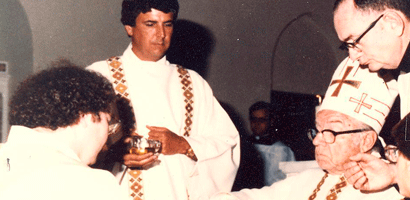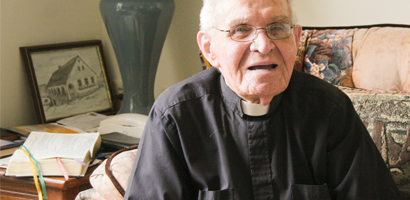
Pictured: Father Frank Cancro (kneeling far left), pastor of Our Lady Queen of Apostles in Belmont, is pictured during his ordination in 1981. Also pictured (from left) are the late Father John Parsons, the late Bishop Michael J. Begley, and Monsignor Joseph Kerin, now retired. (Photo provided by Father Frank Cancro)
A question answered becomes 'a life emptied out'
BELMONT — A question changed Father Frank Cancro's life more than 30 years ago. That question, "How come you're not a priest?" was posed to him repeatedly during the 1970s by an older Sister of Divine Providence. She would point her finger at him as she'd pass him in the halls at a tiny hospital in Martin, Ky., where he worked.
"I decided I didn't want her to ask me that question anymore, so I was going to go away for a weekend and come up with an answer, give it to her and then she wouldn't bother me anymore," Father Cancro said.
"The Glenmarys ran a little reflection center north of where I was, and I spent a weekend there thinking about that very question and had to come back admitting to myself that maybe that is actually what I ought to be open to the possibility of."
What happened next can only be described as divine providence.
"I didn't know what to do about that, so I talked to the only person I knew to talk to."
That was the man who was in charge of a pastoral letter process that Father Cancro was also working on besides his mission work. The man, Bishop Michael J. Begley, just happened to be head of the Diocese of Charlotte at the time.
Father Cancro called him and asked if he could come over the mountains one weekend to talk about the priesthood, but when he got there he instead spent the weekend talking with the vocations director and meeting with the vocation team, with whom Bishop Begley had arranged meetings for him.
"After that process it all seemed very comfortable to me and I said 'yes' to it and started seminary in Baltimore the following fall to study for the Diocese of Charlotte."
Father Cancro greatly enjoyed the graduate work in the seminary and found it to be exciting, so he worked on two degrees there. He also appreciated the help of a spiritual director during that time.
"It was also energizing to be in a community of like-minded people... It made for good friendships and the kind of support that you find when people share a common commitment," he added.
Father Cancro's first assignment after ordination in 1981 was at Bishop McGuinness High School, which was located in Winston-Salem at the time. He found it to be a positive experience to be part of the administration of the school and responsible for the spiritual development of students and faculty, he said.
"That was a very gratifying time, where I think I was able to help shape some things and was able to be taught myself by the experience of those who had been in secondary work for a long time, and the students themselves."
He also really enjoys teaching and has made great contributions over the course of the past 30 years, serving as a professor at Wake Forest University and the Catholic University of America, and also in the Diocese of Charlotte in the area of adult religious education.
"We were only about 10 years old as a diocese and still developing when I was ordained, so I was very much a part of helping to shape what has become our adult formation program here. I found it a joy to not only teach people but to see them make connections, and to recognize something they have learned that might have been just one-dimensional in terms of the theological perspective, now all of a sudden have meaning for them."
In 2005, Father Cancro took a sabbatical and traveled to Asia and the Pacific.
"I experienced that the Church lives and breathes in many different ways around the world and to be in situations where Catholics are in a minority, or where there is still some persecution of the Church, or the presence of the Church is fragile because of the history of a country, and to see that still the faith lives there and that people seek to do the best they can to be Catholic. That was an amazing experience.... You really get a sense of what matters."
Father Cancro, now pastor at Queen of the Apostles Church in Belmont, has also always enjoyed parish life.
"I think the give and take of creating a community, nourishing it in Word and sacrament and being part of how a parish family grows with its challenges as well as its joys – I find it energizing as well as exciting."
In reflecting on the priesthood, Father Cancro shared that "the life of a priest is a life of being emptied out. There are two significant things that a priest does, I believe, in terms of some of the ritual actions of his life. The first is at his ordination: he lays flat on the floor. That prostration is an important sign, not just as who you are humbly before God, but before the rest of the Church as they pray over you. And there is only one other time that a priest gets down on the floor: that is on Good Friday. For me, that is always a sign – a powerful connection of priesthood and the Cross."
His advice to men discerning a priestly vocation? "Pray, pray some more, and let go."
— SueAnn Howell, staff writer

HIGH POINT — At 92, Monsignor Anthony Kovacic is the Diocese of Charlotte's most senior member of the clergy. He also holds the current record for most years being ordained, as he celebrates his 65th ordination anniversary this month.
Monsignor Kovacic, affectionately known as "Father Tony," was born in the Slovenian town of Bizeljsko in 1920. His life has been filled with joys and sorrow, narrowly escaping the Nazis who invaded his home country and killed many of his family members in concentration camps and making his way to Rome to study for the priesthood.
"In a way, my life is many miracles," said Monsignor Kovacic in an interview included in his farewell celebration booklet, compiled when he was leaving Queen of the Apostles Church in Belmont, to move to his current residence at Pennybyrn at Maryfield in High Point in March of last year.
"The biggest miracle was that I became a priest."
Pictured: Monsignor Anthony Kovacic, a pioneer of desegregation in the Diocese of Charlotte, is pictured at Pennybyrn at Maryfield in 2011. In the background is a photo of the home he lived in as a child in Slovenia. (SueAnn Howell, Catholic News Herald)
Monsignor Kovacic is one of a handful of seminarians from his homeland who was "rescued" by Pope Pius XII. He studied in Rome and was ordained a priest in 1947. He was assigned to work in the Colonia Marina refugee camp in Salerno, helping fellow displaced persons from 1948 to 1951. He had hopes of working in foreign missions in Australia, but after discovering he had tuberculosis was prevented from doing so. After review of updated medical records, he was found to be cured of the tuberculosis and cleared to work in the U.S.
In 1951 Bishop Vincent S. Waters of the Diocese of Raleigh put him straight to work as assistant pastor at St. Patrick Cathedral in Charlotte. At that time, there were only 5,000 Catholics in all of North Carolina. Monsignor Kovacic spent a year at the cathedral before being transferred to eastern North Carolina, where he helped build up the Church in Kinston, Tarboro, Scotland Neck, New Bern and Greenville over the next 13 years.
His love for all people helped him during the 1960s when he was charged with creating the first desegregated school, St. Joseph Catholic School, in New Bern. Monsignor Kovacic traveled to nearby military bases and communities and appealed to the families there to enroll their children, and eventually he reached the goal of 100 students split evenly along racial lines.
Monsignor Kovacic served in 12 parishes in the state, with more than 29 years of service spent in the Diocese of Charlotte. His legacy in the "missions of North Carolina" also includes the construction of churches and parish centers, the directorship of the diocese's permanent diaconate program at its inception in 1980, leading the Cursillo movement in the diocese for many years, and bringing the first active Knights of Columbus Council to Queen of the Apostles Church.
"Parish work was always enjoyable," Monsignor Kovacic said in an interview with the Catholic News Herald last summer. He believes his ministry has always been to help people know the faith, and his greatest joys have come from his work with converts, visiting the sick and spending time with families in his parishes over the years.
Though Monsignor Kovacic formally retired in 1994, he continues to concelebrate Mass alongside the other retired priests at Pennybyrn and share his stories and his infectious smile with all those he meets.
-- SueAnn Howell, staff writer

